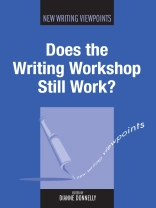This book explores the effectiveness of the workshop in the Creative Writing classroom, and looks beyond the question of whether or not the workshop works to address the issue of what an altered pedagogical model might look like. In visualising what else is possible in the workshop space, the sixteen chapters collected in ‘Does the Writing Workshop Still Work?’ cover a range of theoretical and pedagogical topics and explore the inner workings and conflicts of the workshop model. The needs of a growing and diverse student population are central to the chapter authors’ consideration of non-normative pedagogies. The book is a must-read for all teachers of Creative Writing, as well as for researchers in Creative Writing Studies.
Cuprins
Foreword – Graeme Harper
Introduction: ‘If it Ain’t Broke, Don’t Fix it, ’ Or ‘Change is Inevitable—Except from a Vending Machine.’ – Dianne Donnelly
Section One: Inside the Writing Workshop Model
1. Once More to the Workshop: A Myth Caught in Time – Stephanie Vanderslice
2. Workshop: An Ontological Study – Patrick Bizzaro
3. Small Worlds: What Works in the Workshop if and When They Do – Philip Gross
4. Teaching as a Creative Act: Why the Workshop Works in Creative Writing – Anna Leahy
5. Workshopping and Fiction: Laboratory, Factory, or Finishing School? – Willy Maley
Section Two: Engaging the Conflicts
6. Poetry, F(r)iction, Drama: The Complex Dynamics of Audience in the Writing Workshop – Tim Mayers
7. Engaging the Individual/Social Conflict within Creative Writing Workshops – Brent Royster
8. Potentially Dangerous: Vulnerabilities and Risks in the Writing Workshop – Gaylene Perry
9. ‘Its fine, I guess’: Problems with Peer Review and What These Indicate about the Status of the Workshop Model in College Composition Courses – Colin Irvine
Section Three: The Non-Normative Workshop
10. The Writing Workshop in the Two-Year College: Who Cares? – David Starkey
11. Workshopping Lives – Mary Ellen Bertolini
12. The Things I Used to Do: Workshops Old and New – Keith Kumasen Abbott
Section Four: New Models for Relocating the Workshop
13. Re-envisioning the Workshop: Hybrid Classrooms, Hybrid Texts – Katharine Haake
14. Introducing Masterclasses – Sue Roe
15. Wrestling Bartleby: Another Workshop Model for the Creative Writing Classroom – Leslie Wilson
16. ‘A Space of Radical Openness’: Re-visioning the Creative Writing Workshop – Mary Ann Cain
Afterword: Disciplinarity and the Future of Creative Writing Studies – Joseph Moxley
Despre autor
Dr. Dianne Donnelly is the associate director of the CCCC-Award winning composition program at the University of South Florida. In addition to her interests in rhetoric & composition and writing program administration, she is a creative writer and craft critic who addresses the theory and pedagogy of creative writing. Her pedagogical works include Does the Writing Workshop Still Work? (2010), The Emergence of Creative Writing Studies as an Academic Discipline (2011), and Key Issues in Creative Writing (with Graeme Harper, 2012). She is a frequent presenter at the creative writing pedagogy forums at CCCC and AWP; reviewer for Pedagogy, TEXT, and multiple presses; senior creative writing editor for Writing Commons; and editorial board member for New Writing: The International Journal for the Practice and Theory of Creative Writing.












